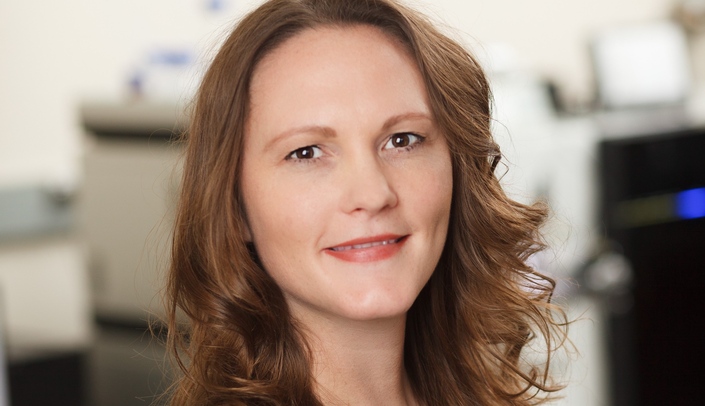Rebekah Gundry, Ph.D., is one of only 12 investigators nationwide to receive a "COVID-19 and Its Cardiovascular Impact Rapid Response Grant" from the American Heart Association.
The one-year, $100,000 grant will allow Dr. Gundry to explore the role of glycans, carbohydrates attached to proteins and lipids, in cardiovascular injuries in COVID-19 patients.
"The COVID infection predominantly targets the respiratory system, but there have been numerous reports of cardiovascular problems in these patients," said Dr. Gundry, professor and vice chair of the University of Nebraska Medical Center Department of Cellular and Integrative Physiology. "But the cause of the heart injury and how it relates to the COVID infection is unknown at this point."
Glycans play critical roles in post-viral immune reactions, including those that involve the heart.
"Recent data show that individuals with blood group A have a significantly higher risk for acquiring COVID compared to non-A blood groups, where blood group O has a lower risk," Dr. Gundry said who also is assistant chief of basic and translational research in the Division of Cardiovascular Medicine, and director of the CardiOmics Program in the Center for Heart and Vascular Research. "That actually has been shown in other types of viral infections, as well. We know that there are these motifs, patterns of sugars, that define your ABO blood group, and these are somehow linked to your susceptibility to infection, but we don't know the specific structures that are conveying resistance.
"Glycans are critical to the pathogenesis of disease, and they also could potentially be informative as biomarkers in predicting which patients are going to have different types of outcomes after infection."
The Gundry lab has recently developed a new analytical platform, called GlyThyra, which is designed specifically to bring mass spectrometry-based glycomic analyses to precision medicine. Combining this powerful technology with the clinical and biobanking resources available at UNMC was a key advantage when it came to competing for the AHA grant.
"We're going to use this analytical platform to study glycans in the blood, and we're going to define the ABO antigens, those ABO structures that are able to differentiate patient responses to COVID infection. Of those, which are indicative of patients who are going to be resistant to myocardial injury?
"In addition, we're going to be looking at those glycans that are present on a type of white blood cell, a CD4-positive T cell, that we know has a role in effects that lead to heart damage when the immune response happens. We're going to define the changes that might be driving how these cells are involved in the start of myocardial injury.
"At the end, we should know the structures that not only are biomarkers that differentiate whether patients are resistant or susceptible to COVID infection, but those who are going to be more susceptible to the myocardial injury aspect."
Long-term, the study could provide the foundation for future personalized medicine approaches that will be possible after defining which sets of glycan structures are predictive biomarkers for patient response, potentially allowing a prognosis at an earlier stage of infection.
Dr. Gundry's proposal was part of an overwhelming response to the AHA, with more than 750 proposals submitted, marking it as one of the association's largest submissions to a single topic request for applications.
"We were just blown away and so impressed to see this level of interest and commitment from the teams submitting such thorough proposals so quickly – our submission deadline was less than two weeks," said American Heart Association president Robert Harrington, M.D., Arthur L. Bloomfield Professor of Medicine and chair of the department of medicine at Stanford University.
"There's so much we don't know about this unique coronavirus and we continue to see emerging complications affecting both heart and brain health for which we desperately need answers and we need them quickly," Dr. Harrington said.
We are Nebraska Medicine and UNMC. Our mission is to lead the world in transforming lives to create a healthy future for all individuals and communities through premier educational programs, innovative research and extraordinary patient care.
Twitter | Facebook | Instagram | YouTube | Flickr
UNMC researcher one of 12 to receive grant to study heart related to COVID-19
- Written by John Keenan
- Published May 8, 2020

Media Contact
Vicky Cerino
UNMC Strategic Communications
(402) 559-5190
(402) 559-4353
vcerino@unmc.edu